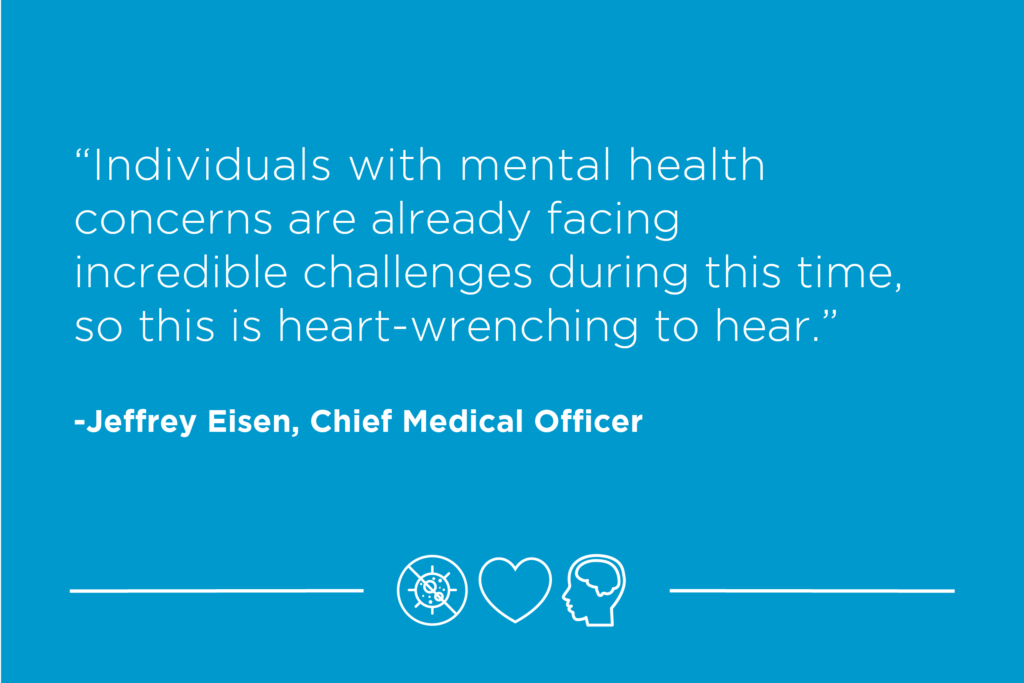October 19, 2020
Individuals with Mental Health Concerns are at Increased Risk for COVID-19 Infection and Death
 The COVID-19 pandemic has highlighted the drastic health disparities that exist in our country, especially for black and brown communities. Now, there is new evidence emerging from medical experts and health institutions showing that COVID-19 is disproportionately affecting those who suffer from a mental health concern.
The COVID-19 pandemic has highlighted the drastic health disparities that exist in our country, especially for black and brown communities. Now, there is new evidence emerging from medical experts and health institutions showing that COVID-19 is disproportionately affecting those who suffer from a mental health concern.
Several recent studies have shown that individuals with mental health concerns are a highly vulnerable population for COVID-19 infection and its adverse outcomes, and emphasize ethnic and gender health disparities. According to the research:
- Patients with a recent mental health diagnosis have a significantly higher risk for COVID-19 infection as compared to patients without
- Patients with a recent mental health diagnosis present a worse outcome as evidenced by higher rates of hospitalization and death
- Lifetime and recent diagnosis for specific concerns in the COVID-19 population were highest for depression, followed by ADHD, bipolar disorder, and schizophrenia
- Among patients with a recent mental health diagnosis, blacks had a higher risk for COVID-19 than whites
- Women with a recent mental health diagnosis had higher odds of COVID-19 infection than men, though death and hospitalization rates are higher in men
We know that individuals who struggle with severe and persistent mental health diagnoses die 20 to 30 years sooner than those without. We also know that these individuals’ deaths are typically not due to mental health concerns, but to other health problems – hypertension, asthma, diabetes – that haven’t been adequately treated, and can be aggravated by health habits that include tobacco use, low levels of physical activity, poor nutrition, and substance use.
While medical experts are unclear on exactly why mental health concerns predispose COVID-19–related infection, hospitalization, and mortality, we can now see that there are clear correlations between physical and mental health as it relates to the COVID-19 pandemic. When it comes to COVID-19, we need an effective, integrated approach to caring for people with complex healthcare needs.
“Individuals with mental health concerns are already facing incredible challenges during this time, so these are heart-wrenching statistics to hear as a mental health provider. At Cascadia, we are striving to address health disparities so we can provide everyone in our community the opportunity to live a full, healthy life. We will continue to ensure our clients – especially marginalized and vulnerable community members – get the proactive, integrated care they need to stay healthy in this pandemic and hope others in the medical community will make the same commitment,” said Jeffrey Eisen, Chief Medical Officer at Cascadia.
As we continue to navigate this public health crisis, it’s crucial that we understand how behavioral health concerns affect COVID-19 infection, hospitalization, and mortality, as well as recognize the new and existing health disparities that affect various communities and demographics. Even more important, we must work to ensure all community members are able to stay safe, recover from the virus, and live a full, healthy life.
To learn more about how Cascadia is navigating the pandemic, visit our COVID-19 Information and Resources Page.
Sources: Center for Artificial Intelligence in Drug Discovery, School of Medicine, Case Western Reserve University, Cleveland, OH, USA; National Institute on Drug Abuse, National Institutes of Health, Bethesda, MD, USA
